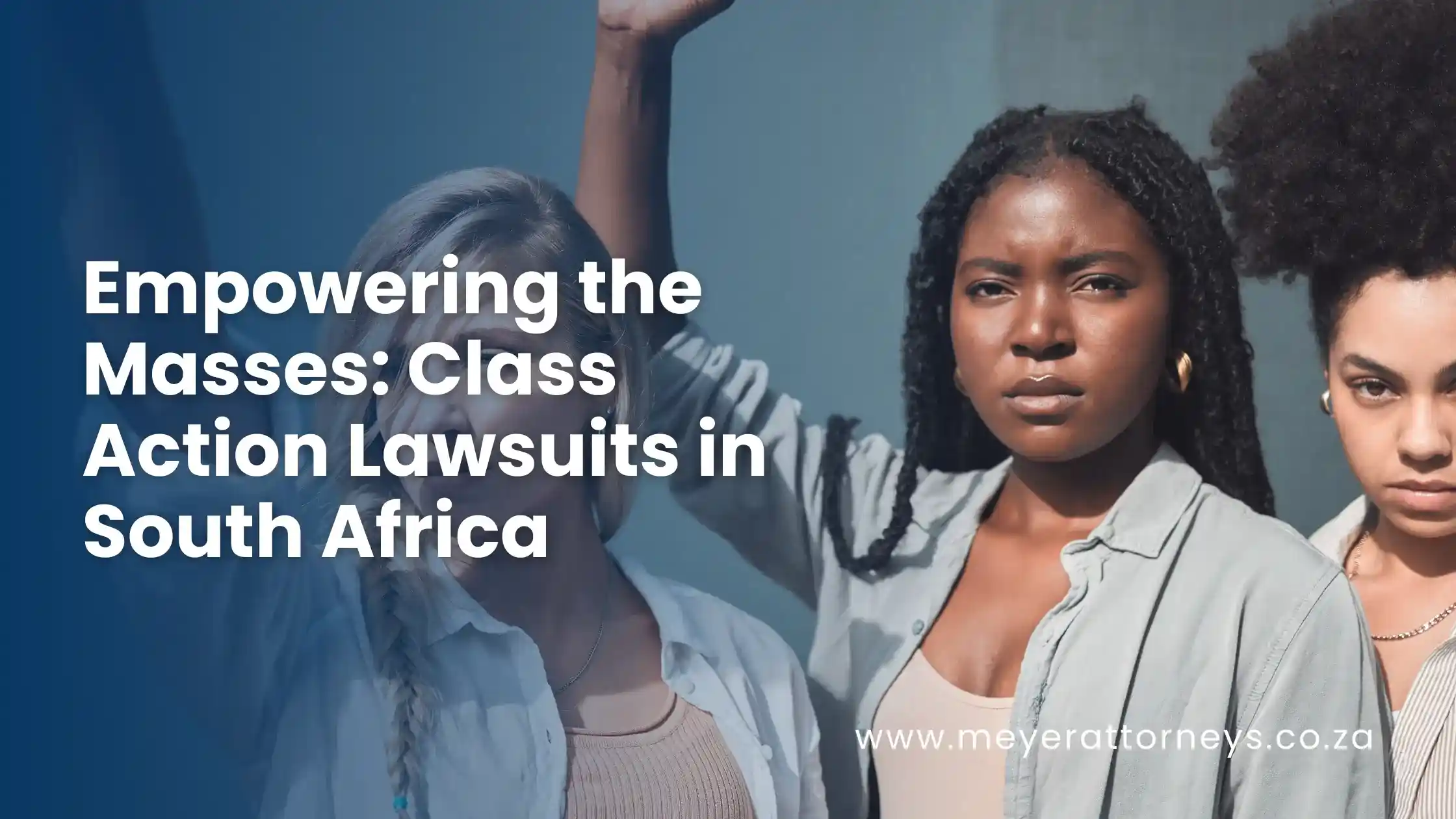Empowering the Masses.

Class Action Lawsuits in South Africa.
In South Africa, the legal landscape has evolved to include an essential mechanism for individuals who have suffered harm as part of a larger group – class action lawsuits. These lawsuits allow groups of people with similar claims to collectively seek justice and compensation. This article explores the concept as applied in South Africa, how they work, and their significance in upholding justice.
Understanding Class Action Lawsuits.
A class action lawsuit is a legal proceeding in which a group of people who have suffered similar harm or damages collectively file a lawsuit against a common defendant, often a corporation or entity, seeking compensation or other legal remedies. This mechanism is crucial when a single individual’s claim may not be substantial enough to warrant a lawsuit.
Key Features.
- Legal Representation: It must be brought by a representative plaintiff or lead plaintiff who files the lawsuit on behalf of the entire group, known as the class.
- Commonality: To form a class, there must be common questions of law and fact among the members. This means that the claims and circumstances must be substantially similar.
- Certification: Before it can proceed, the court must certify the class, determining that it meets the necessary criteria and that a class action is the most efficient way to address the claims.
- Opt-In vs. Opt-Out: In South Africa, class action lawsuits typically operate under the opt-in system, where potential class members must actively choose to join the lawsuit.
Significance in South Africa.
- Consumer Protection: It empowers consumers by providing a collective legal avenue for addressing issues such as defective products, misleading advertising, and unfair business practices.
- Social Justice: These lawsuits enable individuals who might not have the financial resources to take on large corporations or institutions to seek justice.
- Human Rights: In cases involving mass human rights violations or widespread harm, class actions can be a powerful tool for achieving justice and compensation.
- Efficiency: Class actions are often more efficient than multiple individual lawsuits, saving court time and resources.
Notable Class Action Lawsuits in South Africa.
- Silicosis and Tuberculosis Case: In a landmark case, miners suffering from silicosis and tuberculosis contracted while working in gold mines initiated a class action lawsuit against mining companies. The case resulted in a historic settlement, providing compensation to affected miners.
- Consumer Class Actions: Several cases have addressed issues like overcharging on bank fees and consumer protection matters, providing relief to affected consumers.
Challenges and Considerations.
- Certification: Obtaining certification for a class action can be challenging and requires meeting strict legal criteria.
- Legal Representation: Lead plaintiffs and their legal teams play a vital role, and it is crucial to select experienced lawyers.
- Opt-In System: The opt-in system requires potential class members to actively participate by joining the lawsuit, which can limit the size of the class.
In conclusion.
Class action lawsuits in South Africa are a powerful tool for protecting the rights and interests of consumers, citizens, and individuals who have suffered massively. These legal actions provide a means for holding corporations, institutions, and entities accountable, and they are a testament to the principles of justice, equality, and empowerment within the South African legal system. Class action lawsuits play a vital role in balancing the scales of justice, giving a collective voice to those who may otherwise go unheard.
If your issue relates to consumer practices and you would like to learn more click here.
If you would like a more in-depth look, click here.
If you would like to know more about employment rights as a ground for class actions click here.
If you would like to know more about diseases as a basis for class action lawsuits click here.
If you would like to know more about Ponzi schemes as a basis for class action lawsuits click here.
If your query relates to public nuisance or noise complaints click here.
If you would like to know more about power of attorneys click here.
This article is a general information sheet and should not be used or relied on as legal or other professional advice. No liability can be accepted for errors, omissions, loss, or damage arising from reliance upon any information herein. Don’t hesitate to contact Meyer and Partners Attorneys Incorporated if you require further information or specific and detailed advice. Errors and omissions excepted (E&OE).